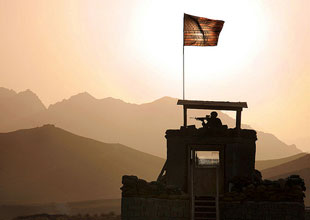During a trip to Afghanistan this week, Sen. Carl Levin (D-Mich.), the chairman of the Armed Services Committee and a skeptic of the president’s troop surge, says he saw a number of positive signs. Speaking to reporters via conference call from Dubai, where he was awaiting a flight back to Washington, Levin said he saw “real partnering going on” between coalition and Afghan forces, sensed “a significant increase in optimism about the possibility of success,” and believed the military’s “counterinsurgency strategy is taking hold.” According to Levin, Lt. Gen. William Caldwell, who’s in charge of the effort to train the Afghan army and police, told him that President’s Obama’s deadline for transitioning US forces out of Afghanistan had provoked an immediate and “stunning” response from Afghan leaders.
That had a very positive effect on the Afghan leadership and focused their energies on, for instance, obtaining a larger number of recruits for their army… It was such a large increase that they couldn’t even handle them physically… Gen. Caldwell was very clear that the reason that happened was because the Afghan leaders realized that President Obama was serious and meant business when he said that the commitment here is not open-ended.
The upswing in new recruits is good news, but Levin also said he learned something about the training effort that dismayed him: When it comes to the preliminary 8-week course for new Afghan army and police trainees, only about 37 percent of the necessary trainers are in place.
“That is really inexcusable,” he said, blasting America’s coalition partners (which ones, he wouldn’t say) for failing to ante up the needed personnel. “The allies here have made commitments that have not been kept to provide those trainers. The coalition countries should step up to the plate at least in this area. If they’re not going to provide additional combat troops, for heaven’s sake they ought to carry out their commitments in this area.” (Asked whether the US may not be meeting its own requirements on the trainer front, Levin said, “It could be. It could be part of that. We don’t have the breakdown.”)
The Obama administration’s strategy calls for boosting Afghanistan’s army and police forces by about 50 percent over the next year-and-a-half. According to Levin, top military officials he met with in Afghanistan assured him that the “the first thousand troops that come to Afghanistan are going to be put into training.” Levin has long voiced concerns over deploying additional combat troops to the country, preferring what he has called an “Afghan surge” that entails hastening the training of the country’s security forces to take the lead in stabilizing their nation.
On Tuesday Levin and Sen. Al Franken (D-Minn.) met with President Hamid Karzai in Kabul, where, among other things, they discussed a forthcoming plan from the Afghan government to reintegrate low- and mid-level members of the Taliban back into society. Levin, a proponent of efforts to peel away lower-echelon Taliban fighters, said the strategy is expected to be announced before the end of January, when world leaders will convene in London for a conference on Afghanistan. “It’s long overdue,” Levin said, “and it’s a critical part of success in Afghanistan.”
Follow Daniel Schulman on Twitter.















